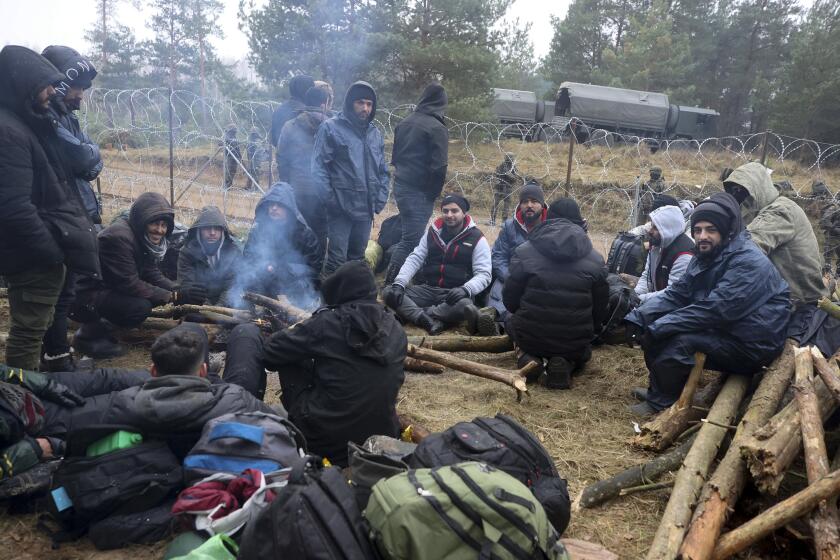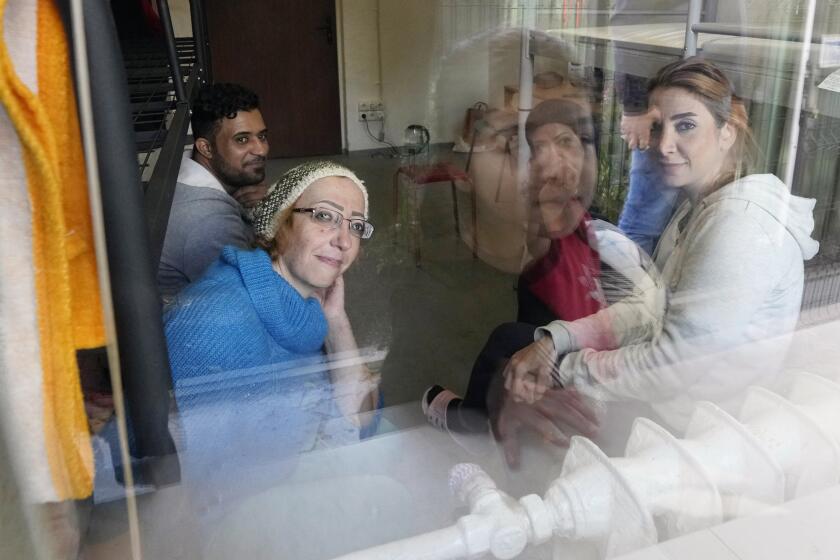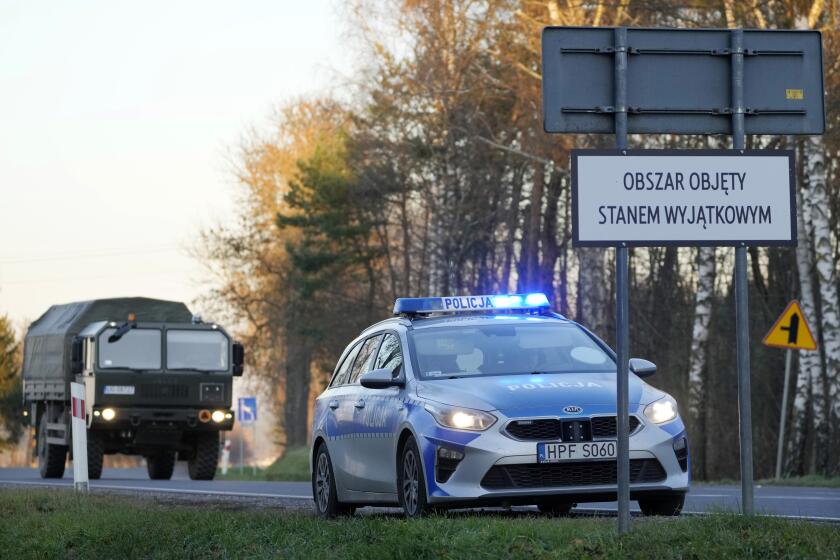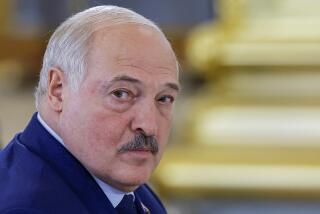Hundreds of Iraqi migrants caught in EU-Belarus border standoff fly home

MOSCOW â Hundreds of Iraqis flew home from Belarus on Thursday, abandoning their hopes of reaching the European Union after a tense standoff at the Poland-Belarus border, where thousands of migrants have been stranded.
Meanwhile, state-run Belarusian media reported that there were no more migrants left in makeshift camps near the frontier after authorities opened a heated warehouse for them to take shelter from the cold. The report could not immediately be verified.
Since Nov. 8, some 2,000 people, mostly from the Middle East, have been trapped at the border crossing in a wet and freezing forest as forces from Poland and Belarus faced off against each other. At least 12 people have died in the area in recent weeks, including a 1-year-old whose death was reported by a Polish humanitarian organization Thursday.
Most of the migrants are fleeing conflict or hopelessness at home and aim to reach Germany or other Western European countries. But Poland didnât want to let them in, and Belarus didnât want them returning to its capital, Minsk, or settling elsewhere in the country.
The West has accused Belarusian President Alexander Lukashenko of luring the migrants to the border to use them to destabilize the 27-nation EU in retaliation for its sanctions on his authoritarian regime. Belarus denies orchestrating the buildup of migrants, who have been allowed into Belarus since summer and then tried to cross into Poland, Lithuania and Latvia, the EUâs eastern flank.
Amid the tug-of-war, 430 Iraqis have registered for flights home, according to Majid Kilani, Iraqâs consul in Russia; 374 boarded a flight that left Thursday afternoon, Lukashenko spokeswoman Natalya Eismont said. The flight was scheduled to make two stops: one in the Iraqi city of Irbil and another in the capital, Baghdad.
Fears that the authoritarian leader of Belarus is using migrants as a weapon to destabilize the European Union put new strains on the 27-nation bloc.
Other migrants have moved to a nearby warehouse, which Belarusian authorities set up Tuesday, offering mattresses, water, hot meals and medical assistance.
That left no one at the border camps, state-run agency Belta said Thursday.
In all, Eismont said, as many as 7,000 migrants remain in Belarus.
In the latest salvo in the war of words, EU Commissioner for Home Affairs Ylva Johansson accused Belarus of engaging in âan act of state-sponsored migrant-smugglingâ and said that sanctions and stopping flights to Minsk with migrants aboard were âour most effective tools in this struggle.â
People hoping to reach Europe from war-torn lands are finding themselves pawns in an escalating dispute between Belarus and the European Union.
Foreign ministers of the G-7 group of leading industrialized countries also condemned âthe Belarus regimeâs orchestration of irregular migration across its bordersâ in a statement Thursday.
Eismont said the fact that hundreds of people were leaving Belarus shows that the government is holding up its part of the bargain. The rest are âcategorically refusing to fly, but we will work on it,â she said.
Earlier this week, according to Eismont, Lukashenko proposed to German Chancellor Angela Merkel that the EU could open a âhumanitarian corridorâ to allow 2,000 migrants to head to Germany, while Belarusian authorities would work on convincing the other 5,000 to return to their home countries.
In response to a request for comment, Merkelâs office referred to its statement Tuesday on the call between her and Lukashenko, in which she stressed the need for humanitarian assistance and for the migrantsâ safe return home.
Hundreds of migrants are massed at the Belarus-Poland border in what the European Union calls a deliberate attempt by Belarus to destabilize the bloc.
Poland has taken a tough stand against the migrantsâ illegal entry, reinforcing the border with riot police and troops and making plans to build a tall steel barrier. The Polish approach has largely met with approval from fellow EU nations, which want to stop an influx of migrants.
But Poland also has been criticized by human rights groups and others for pushing migrants back into Belarus and not allowing them to apply for asylum.
In recent days, a melee broke out on the border, with migrants throwing stones at Polish forces massed on their side of the razor-wire fence, injuring 12, and the troops responding with water cannons and tear gas. Warsaw accused Belarusian forces of instigating the conflict, while the government in Minsk denounced Polandâs âviolent actions.â
Lukashenko has rejected accusations of engineering the crisis and said his government had deported about 5,000 migrants this fall.
In May, however, he had railed against the EU sanctions imposed on his country for his harsh crackdown on internal dissent, saying: âWe were stopping migrants and drugs â now you will catch them and eat them yourself.â
More to Read
Sign up for Essential California
The most important California stories and recommendations in your inbox every morning.
You may occasionally receive promotional content from the Los Angeles Times.













